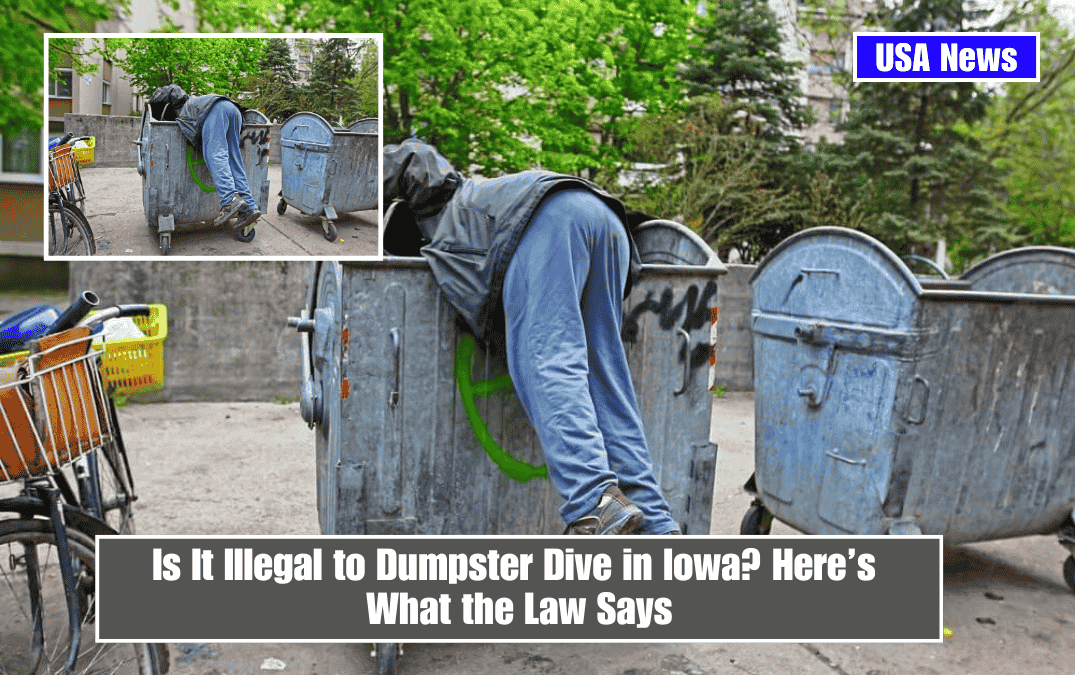Dumpster diving in Iowa is generally legal, but it comes with important caveats tied to property rights and local regulations. The legality of dumpster diving hinges on whether the trash is located on public or private property and whether trespassing laws are violated.
Statewide Legality
Dumpster diving is not explicitly prohibited by Iowa state law. The act of searching through trash is generally permissible when the garbage is located on public property, such as dumpsters placed on city streets or curbs. This aligns with the U.S. Supreme Court ruling in California v. Greenwood (1988), which established that trash left in public areas is considered abandoned and no longer protected under privacy laws.
However, the situation changes when dumpsters are located on private property. Entering private property without permission to access a dumpster can lead to trespassing charges, even if the trash itself is accessible. Businesses or property owners have the right to prosecute individuals who enter their premises unlawfully.
Private Property Restrictions
Most dumpsters in Iowa are located on private property, such as behind businesses or within fenced areas. Diving into these dumpsters without explicit permission from the property owner can result in legal consequences. Trespassing laws are strictly enforced, and signs like “No Trespassing” or locked dumpsters further reinforce these restrictions.
Additionally, tampering with locks or fences to access a dumpster is illegal and can lead to fines or arrests. Business owners may also take legal action if divers create a mess or leave items scattered around the dumpster area.
Local Ordinances
While Iowa does not have statewide laws specifically banning dumpster diving, local ordinances may impose additional restrictions. For example:
- Some cities may regulate waste disposal practices and prohibit scavenging in certain areas.
- Municipalities might require permits for accessing recyclable materials or impose fines for improper disposal of hazardous waste.
It’s advisable to check local regulations before engaging in dumpster diving to avoid violations.
Environmental and Ethical Considerations
Dumpster diving has become popular for environmental reasons, as it promotes recycling and reduces landfill waste. Many divers search for salvageable items like furniture, electronics, or food that can be reused or repurposed. However, divers must ensure they do not violate hazardous waste disposal laws by improperly handling items like batteries or chemicals.
Business owners often appreciate responsible divers who clean up after themselves and respect property boundaries. However, some may worry about liability issues if divers are injured while accessing their dumpsters.
Penalties for Violations
Trespassing on private property can result in fines, citations, or even arrest. In Iowa, penalties for unauthorized use of receptacles include civil fines ranging from $1,000 to $3,000 depending on the number of offenses. Disorderly conduct or littering charges may also apply if divers create disturbances or leave trash behind.
Best Practices
To avoid legal trouble while dumpster diving in Iowa:
- Stick to dumpsters located on public property.
- Avoid fenced-off or locked dumpsters and respect “No Trespassing” signs.
- Seek permission from business owners before diving on private property.
- Keep the area clean and avoid creating a mess.
while dumpster diving is not inherently illegal in Iowa, it becomes unlawful when trespassing occurs on private property or local ordinances are violated. Responsible divers should prioritize safety, respect property rights, and adhere to local regulations to enjoy this eco-friendly activity without legal complications.
SOURCES:-
[1] https://khak.com/are-you-allowed-to-dumpster-dive-in-iowa/
[2] https://b100quadcities.com/is-it-illegal-to-dumpster-dive-in-iowa-illinois/
[3] https://detectingtreasures.com/dumpster-diving-in-iowa/
[4] https://www.findlaw.com/injury/torts-and-personal-injuries/dumpster-diving.html
[5] https://www.rolloffdumpsterdirect.com/dumpster-diving-illegal/









